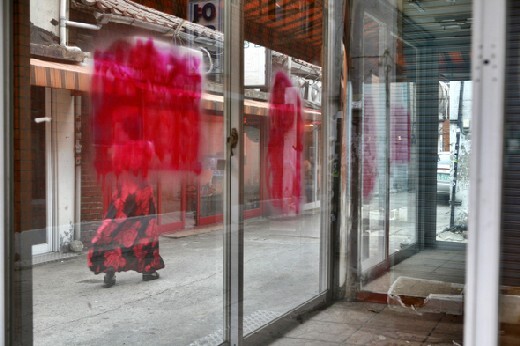hankyoreh
Links to other country sites 다른 나라 사이트 링크
Sex workers suffer alongside residents from the Yongsan demolitions

Last Saturday morning in the area of 391 Hangang-ro 2-ga, a street in front of Seoul‘s Yongsan Station where many prostitution businesses are located, there were few signs of human activity, but more than 10 of the 40 or so businesses located on both sides of the street were open. Female sex workers sat behind show windows waiting for customers. Candlelight demonstrations in the wake of the “Yongsan redevelopment tragedy” have resulted in a large drop-off in evening customers, so an increasing number of sex workers have been coming out on weekend mornings in search of customers. Here at Yongsan Station’s “red-light street,” one only has to cross the street to reach the site of the Yongsan tragedy, where six people lost their lives during the police suppression of a demolition protest last January. The area is fraught with tension, as further demolitions clearing the way for redevelopment have been scheduled for October.
Building owners have hit it big, as redevelopment has led to a major increase in land prices. Property that was selling for 100 million won per pyeong (~3.3 square meters) two years ago is now selling for 200 million won. But redevelopment has claimed more victims beyond those who lost their lives last January. “They say five people died in the tower across the street, but if they try to tear this place down, we aren‘t going to put up any less of a fight than they did,” said a sex worker identified as “Hwang,” 31, who has worked in the area for several years.
The situation is no different in other red light districts in Seoul’s Dongdaemun and Cheongnyangni areas. The areas are awaiting demolition for redevelopment purposes, but the hundreds of millions of won per pyeong in redevelopment profits have gone only to the building owners, and there are no provisions for the female sex workers who work there.
According to some sex workers, few women could quit the prostitution business even if the areas are demolished. “Even if the girls leave here, they‘ve got nowhere to go other than shady places like massage parlors and officetels or other red light districts in the outskirts in Gyeonggi Province,” said “Kim,” who has run a business in the area for the past eight years.
The Iril Chatjip, or one day teahouse for fundraising, opened Saturday in Yongsan. It is a teahouse in Yongsan sponsored by Magdalena House, a religious group that helps female sex workers in the Yongsan area. The place is intended to provide financial support for sex workers who have nowhere to go after the demolitions take place. Magdalena House plans to offer rehabilitation services for the workers as well as a collection fund for creating other types of job positions at grocery stores and other places. “There was some discussion about how part of the proceeds from the redevelopment of the red light district should be used to help the women support themselves, but nothing concrete has taken place yet,” said Magdalena House director Lee Ok-jeong. “They need to put measures in place to secure the women’s livelihoods after demolition,” Lee stressed.
Please direct questions or comments to [englishhani@hani.co.kr]
Editorial・opinion
![[Column] Season 2 of special prosecutor probe may be coming to Korea soon [Column] Season 2 of special prosecutor probe may be coming to Korea soon](https://flexible.img.hani.co.kr/flexible/normal/500/300/imgdb/original/2024/0426/3317141030699447.jpg) [Column] Season 2 of special prosecutor probe may be coming to Korea soon
[Column] Season 2 of special prosecutor probe may be coming to Korea soon![[Column] Park Geun-hye déjà vu in Yoon Suk-yeol [Column] Park Geun-hye déjà vu in Yoon Suk-yeol](https://flexible.img.hani.co.kr/flexible/normal/500/300/imgdb/original/2024/0424/651713945113788.jpg) [Column] Park Geun-hye déjà vu in Yoon Suk-yeol
[Column] Park Geun-hye déjà vu in Yoon Suk-yeol- [Editorial] New weight of N. Korea’s nuclear threats makes dialogue all the more urgent
- [Guest essay] The real reason Korea’s new right wants to dub Rhee a founding father
- [Column] ‘Choson’: Is it time we start referring to N. Korea in its own terms?
- [Editorial] Japan’s rewriting of history with Korea has gone too far
- [Column] The president’s questionable capacity for dialogue
- [Column] Are chaebol firms just pizza pies for families to divvy up as they please?
- [Column] Has Korea, too, crossed the Rubicon on China?
- [Correspondent’s column] In Japan’s alliance with US, echoes of its past alliances with UK
Most viewed articles
- 1No good, very bad game for Korea puts it out of Olympics for first time since 1988
- 2[Column] Season 2 of special prosecutor probe may be coming to Korea soon
- 3Korea’s 1.3% growth in Q1 signals ‘textbook’ return to growth, says government
- 4‘We must say no’: Seoul defense chief on Korean, USFK involvement in hypothetical Taiwan crisis
- 5Is N. Korea threatening to test nukes in response to possible new US-led sanctions body?
- 6Division commander ordered troops to enter raging flood waters before Marine died, survivor says
- 7[Column] ‘Choson’: Is it time we start referring to N. Korea in its own terms?
- 8Will NewJeans end up collateral damage in internal feud at K-pop juggernaut Hybe?
- 9Korea sees more deaths than births for 52nd consecutive month in February
- 10[Editorial] Korea’s surprise Q1 growth requires objective assessment, not blind fanfare